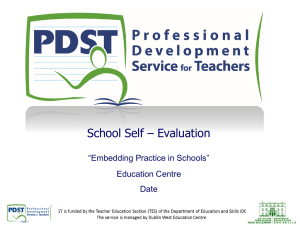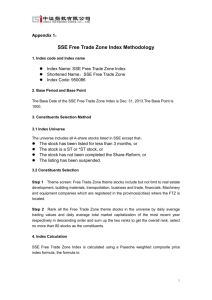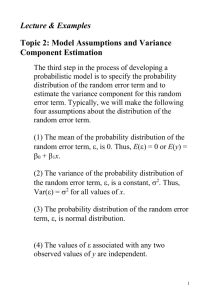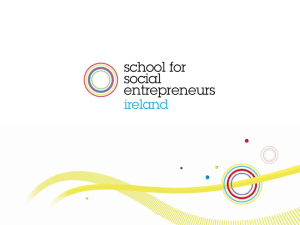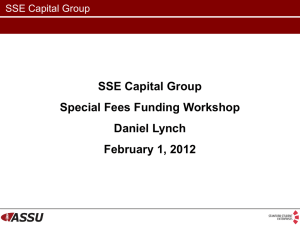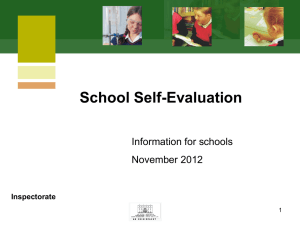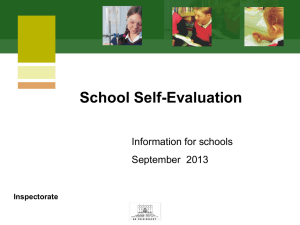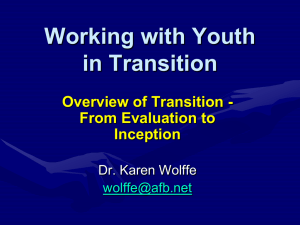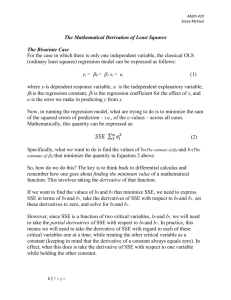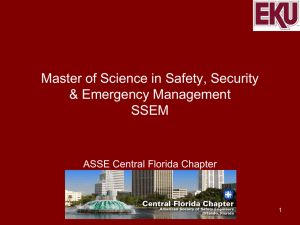SSE PP - 11 November 2013
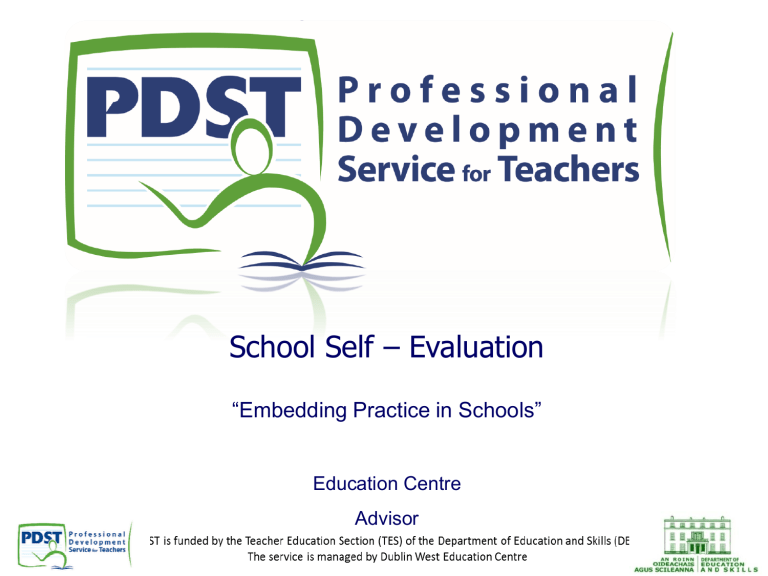
School Self – Evaluation
“Embedding Practice in Schools”
Education Centre
Advisor
Post Primary School Leaders
In-service 2013/2014
•
Junior Cycle Day 1
• SSE Day 1 ( Steps 1 to 4)
•
SSE Day 2 (Steps 5 and 6)
•
Junior Cycle Day 2
Linking initiatives to improve learning
School Self-
Evaluation
• Process to improve learning
Literacy and
Numeracy
• Strategy to improve learning
Junior Cycle
• Curriculum reform to improve learning
Impact:
Improved learning outcomes for students
Today you will:
Have gained further insight into data analysis using data from a real school
Have analysed the data and benchmarked it against the evaluation criteria .
Have tracked the development of a completed School Self Evaluation Report from a real school
Key Messages
• School self-evaluation is about improving the quality of learner outcomes
• School self-evaluation is a reflective, collaborative, whole school process
• The six steps of the school self-evaluation process are continuous but not strictly linear
6
Where schools are at ….
• Gathering evidence
• Analysing evidence
• Drawing conclusions
• Drafting the SSE Report
• Drafting the School
Improvement Plan (SIP)
• School Improvement Plan complete
• Implementing the School
Improvement Plan
• None on the above
Building blocks of the SSE process
1. 6 Step Process 2. Framework
3. Evaluation Criteria &
Quality Statements
1
Gather the evidence
6
Implement and monitor improvement plan
The 6 step process
5
Devise school improvement plan
2
Analyse the evidence
3
Draw conclusions
4
Write school selfevaluation report
SSE - Evaluation Themes
TEACHING and LEARNING
Learner outcomes
• Attainment of subject and programme objectives
Learning experiences
• Learning environment
• Engagement in learning
• Learning to learn
Teachers’ practice
• Preparation for teaching
• Teaching approaches
• Management of students
• Assessment
Evaluation Criteria and Quality
Statements
A School Self-Evaluation Report
The school self-evaluation report (pg 62)
1. Introduction
• The focus
• School Context
2. The findings
3. Progress made on previously identified targets
4. Summary of SSE findings
• Strengths
• Priority areas for improvement
• Legislative and regulatory requirements to be addressed
School Self-Evaluation Report – key points:
1. Is there an outline of the school’s context?
2. Are the findings rooted in the three themes of teaching and learning framework?
3. Are the findings linked to the analysed evidence gathered?
4. Are the strengths and areas for improvement linked to the findings?
5. Has the legislative and regulatory framework been included in the appendix?
Think Pair Share
Gather the evidence
Implement and monitor improvement plan
The 6 step process
Devise school improvement plan
Analyse the evidence
Draw conclusions
Write school selfevaluation report
Guiding Staff Reflection
Learner outcomes
Students’ overall attainment, with regard to knowledge, understanding and skills in subjects and programmes, has improved significantly in line with targets; and expected outcomes have been achieved
Students enjoy learning the subject and have developed appropriate attitudes and dispositions
Students can meet the literacy and numeracy challenges of the subject
Students at risk of underachieving have made good progress
Students’ uptake levels and performance in state examinations compares favourably with national norms, within the school context.
Learning experiences
Learning settings are safe, well maintained, visually stimulating and supportive of literacy and numeracy
Students have access to appropriate materials, including
ICT, to support learning
Students are enabled to engage actively in a range of suitably challenging, relevant and interesting learning opportunities
Students are given support as needed
Students are equipped with tools and skills for learning now and in the future.
Teachers’ practice
Teachers prepare thoroughly for lessons; expected learning outcomes including literacy and numeracy development are clearly stated; and necessary resources are in place
Expected learning outcomes are clearly communicated; lessons are suitably paced to enable progression in development of knowledge and skills
Teaching is focused, stimulating and relevant. All aspects of the subject, including subjectspecific language, are thoroughly taught
All students are respected; high but realistic expectations are communicated; and efforts and achievements are affirmed
A range of assessment methods is used effectively to assess progress.
Summary of Staff Consensus
• Quality of written work is a concern i.e. accuracy, subject specific language & level of detail
• Aware of grades vs national norms but unaware of levels vs national norms
• Staff development on ICT a priority
• Whole staff use of literacy strategies
Well below average below av average average above av well above average
Click here to acces s online
National
Analysing evidence
What do this data seem to tell us about our focus?
What does it not tell us?
What else would we need to know?
Earl and Katz (2006: 63)
Teacher Voice
Student Voice
Drawing Conclusions
School Self-Evaluation Report
The school self-evaluation report (pg 62)
1. Introduction
• The focus
• School Context
2. The findings
3. Progress made on previously identified targets
4. Summary of SSE findings
• Strengths
• Priority areas for improvement
• Legislative and regulatory requirements to be addressed
SSE process - Reflection
Web Site www.pdst.ie/postprimary/sse
Learner
Outcomes
Learning
Experience
Teachers ’
Practice
Standardised scores & entrance assessment spreadsheets
SEC result spreadsheets
Class test results
Sample on-line attitudinal surveys
Checklists & rubrics for literacy & numeracy skills & standards of students ’ work
Sample on-line surveys
SSE guidelines templates for surveys & focus groups
Minutes of meeting relating to teaching & learning
Record of staff reflection on teaching & learning
Sample on-line surveys
SSE guidelines templates for surveys & focus groups www.pdst.ie/postprimary/datagatheringtools
Updates
• June 2014 - SSE Report and SIP in place
• June 2014 - Summary report and SIP made available to parents and school community
• 2016 - 2nd year standardised test will be implemented.
• SSE guidelines and updates
• DES website www.schoolself-evaluation.ie
• Inspectorate visits continuing
• Seminar for school leaders
• Link teacher seminars
Key Messages
• School self-evaluation is about improving the quality of learner outcomes
• School self-evaluation is a reflective, collaborative, whole school process
• The six steps of the school self-evaluation process are continuous but not strictly linear
PDST supports
• SSE specific workshops
Data gathering workshop ( Google Forms)
Data analysis
Clusters
• SSE Day 2 February / March
Writing the School Improvement Plan and its implementation
• Link teacher seminars and clusters
• School support: http://dmsnew.pdst.ie/school/register
• On-line resources : www.pdst.ie
PDST is funded by the Teacher Education Section (TES) of the Department of Education and
Skills (DES). The service is managed by Dublin West Education Centre
